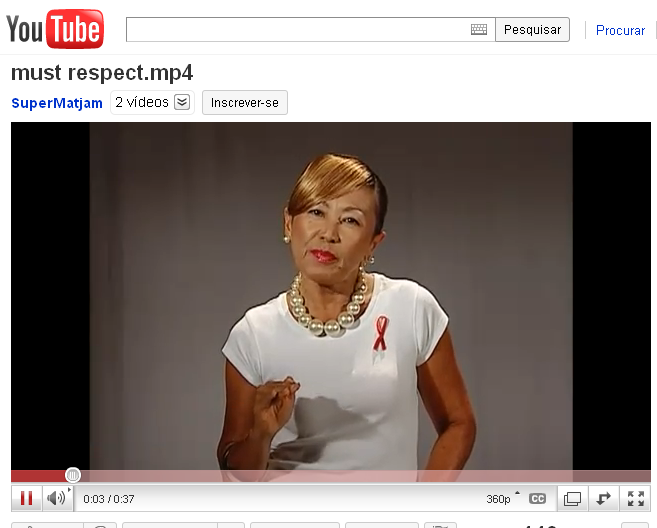Peggy Antrobus, Rhoda Redock, Tracy Robinson, and Aziza Ahmed *
Jamaica is notorious for the homophobic attitudes that have led to violence, death, and harassment of the LGBT community (read The Most Homophobic Place on Earth? and Hated to Death).
Getting less attention, however, are the increasingly vocal Jamaican activists and community members who are calling for respect for LGBT individuals. The April 2010 Walk for Tolerance sponsored by Jamaica AIDS Support for Life and the Sex Workers Association of Jamaica exemplifies this burgeoning support for the need to change stigmatizing and harmful attitudes.
 A recently produced public service announcement (watch the video) focuses attention on the need to respect LGBT individuals, if for no other reason to allow LGBT people to access health services in the face of HIV. The announcement features prominent Jamaicans requesting tolerance of the Jamaican LGBT community. Tolerance, the PSA clarifies, does not mean acceptance it only means respect.
A recently produced public service announcement (watch the video) focuses attention on the need to respect LGBT individuals, if for no other reason to allow LGBT people to access health services in the face of HIV. The announcement features prominent Jamaicans requesting tolerance of the Jamaican LGBT community. Tolerance, the PSA clarifies, does not mean acceptance it only means respect.
This line tugs at the heart of those who work for social justice; a reminder that despite this high-profile plea for change, in Jamaica and other countries LGBT individuals are left to beg for the basic safety and security that others can take for granted.
In other parts of the Caribbean strong activist groups have emerged as well. In Guyana, an organization called SASOD (the Society Against Sexual Orientation Discrimination) and in Trinidad and Tobago an organization called CAISO (Coalition Advocating for Inclusion of Sexual Orientation) have been carrying out activism and public advocacy on the media, with government officials and with religious organizations.
Recently in Trinidad and Tobago, the visit of a US pastor, said to have been saved from homosexuality, was publicly denounced by a group of young male students of the University of the West Indies, most of them students of the course Men and Masculinities in the Caribbean offered by the Institute for Gender and Development Studies. The action was part of what they called a larger “gay-straight” alliance.
Despite this activism, the deep inequalities, discriminations, and risks
faced by the LGBT were made clear on November 17th, 2010, at the Third Committee of the UN General Assembly, as when a resolution on extrajudicial execution was tabled a motion was also proposed to
remove a reference to sexual orientation from the text. The resolution urges States to protect the right to life of all people, including by calling on states to investigate killings based on discriminatory grounds. For the past 10 years, the resolution has included sexual orientation in the list of discriminatory grounds on which killings are often based. A vote followed the motion, which resulted in 77 countries supporting the removal against 70 that voted to retain it. Caricom countries either voted against or abstained (read the ARC International and IGLHRC press release). Given current statements by the governments of Barbados, Antigua, St. Kitts and Nevis, and Trinidad and Tobago in support of the rights of LGBT people in our region, we are deeply disappointed at their failure to oppose the motion.
____________________________________
* These women are all feminists and committed to advancing gender justice from wherever they are located.
Peggy Antrobus established the Women & Development Unit (WAND) within the University of the West Indies (UWI) in 1977. She is a founding member of DAWN and General-Coordinator from 1990-1996. Now retired, Peggy tries to continue contributing to the struggles for gender justice when and however she can.
Rhoda Redock is member of the SPW’s Advisory Group and Professor at the Centre for Gender and Development Studies at the University of the West Indies.
Tracy Robinson is Jamaican, attorney-at-law and lecturer in law at the Cave Hill/Barbados Campus of UWI. She works on human rights issues and especially with women marginalized within larger movements for rights and social justice. She is a consultant to UNIFEM on the full range of women’s right issues and in recent years founded a Coalition Against Sexual Harassment (CASH) in Barbados.
Aziza Ahmed is Assistant Professor of Law at Northeastern University School of Law where she teaches sexual and reproductive health and rights amongst other courses.
